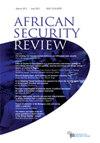Protection through peacebuilding in South Sudan
IF 1.1
Q3 INTERNATIONAL RELATIONS
引用次数: 1
Abstract
ABSTRACT Protecting civilians has been the primary raison d’être of the UN Mission in South Sudan (UNMISS) since civil war erupted in late 2013. Since then, UN efforts to protect vulnerable civilians have focused on a handful of so-called protection of civilians (PoC) sites. While they have unquestionably saved lives, the PoC sites have also absorbed the lion’s share of mission resources, severely limiting UNMISS’ ability to protect civilians elsewhere. The signing of the still-fragile Revitalised Agreement on the Resolution of the Conflict in South Sudan (R-ARCSS) has enabled a reconsideration of the UNMISS protection mandate in light of what remains an uncertain transition. Given the systemic constraints on the UN’s ability to project force in the name of PoC, we argue that UNMISS’ most constructive and lasting contribution to both protection and peace in South Sudan will be through sustained investments in inclusive local-level peacebuilding. Re-orienting the PoC mandate along these lines offers an opportunity to at least partially counteract the decidedly exclusive nature of the country’s current peace process, and to support bottom-up conflict resolution processes that could eventually interact in constructive ways with top-down dynamics.通过南苏丹建设和平提供保护
自2013年底南苏丹内战爆发以来,保护平民一直是联合国南苏丹特派团(UNMISS)的首要任务être。从那时起,联合国保护弱势平民的努力一直集中在少数几个所谓的平民保护地点。虽然PoC地点无疑拯救了生命,但它们也占用了特派团的大部分资源,严重限制了南苏丹特派团在其他地方保护平民的能力。《关于解决南苏丹冲突的振兴协定》(R-ARCSS)的签署仍然脆弱,这使得在过渡仍然不确定的情况下,能够重新考虑南苏丹特派团的保护任务。鉴于联合国以维和行动的名义部署兵力的能力受到系统性限制,我们认为,南苏丹特派团对南苏丹保护与和平的最具建设性和最持久的贡献将是通过对包容性地方一级建设和平的持续投资。沿着这些路线重新定位PoC的任务提供了一个机会,至少可以部分抵消该国目前和平进程的决定性排他性,并支持自下而上的冲突解决进程,最终可能以建设性的方式与自上而下的动态相互作用。
本文章由计算机程序翻译,如有差异,请以英文原文为准。
求助全文
约1分钟内获得全文
求助全文

 求助内容:
求助内容: 应助结果提醒方式:
应助结果提醒方式:


